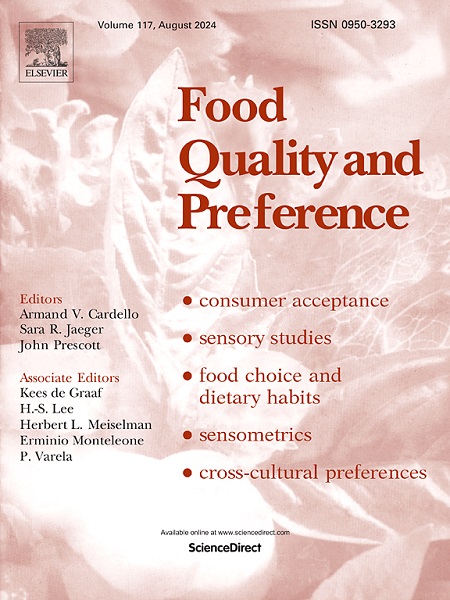通过扩展的综合行动决定模型解释德国消费者采用可持续饮食和健康饮食的原因
IF 4.9
1区 农林科学
Q1 FOOD SCIENCE & TECHNOLOGY
引用次数: 0
摘要
本研究基于并扩展了经删节的综合行动决定模型,以预测德国消费者样本中自我报告的饮食行为。研究重点关注饮食行为的两个相关但概念不同的方面:健康饮食和可持续饮食。具体而言,该模型评估了健康意识、态度、感知行为控制以及社会和个人规范对采用健康饮食的作用,以及环境关注、感知消费者有效性、需求意识、自我效能、态度、感知行为控制以及社会和个人规范对采用可持续饮食的作用。研究采用纵向设计,收集了 620 名德国居民的数据,两次数据收集相隔 4 周。路径分析显示:(i) 态度、社会规范和个人规范与健康饮食呈正相关;(ii) 社会规范和个人规范与可持续饮食呈正相关,但态度与可持续饮食无关;(iii) 感知到的行为控制与健康饮食和可持续饮食无关。这些变量解释了健康饮食中 35% 的变异,以及可持续饮食中 27% 的变异。这项研究强调,各自的信念和规范可预测饮食行为的两个方面。这些预测因素可受到公共政策宣传、媒体和沟通的影响。本文章由计算机程序翻译,如有差异,请以英文原文为准。
Explaining the adoption of sustainable diets and healthy diets among German consumers via an extended comprehensive action determination model
This study builds upon and extends the abridged comprehensive action determination model to predict self-reported eating behaviors among a sample of German consumers. It focuses on two related but conceptually distinct facets of eating behaviors: healthy eating and sustainable eating. Specifically, the role of health consciousness, attitude, perceived behavioral control, and social and personal norms for the adoption of healthy diets, as well as the role of environmental concern, perceived consumer effectiveness, awareness of need, self-efficacy, attitude, perceived behavioral control, and social and personal norms for the adoption of sustainable diets are assessed. A longitudinal design was applied and data from 620 German residents were collected, with the two data collections being 4 weeks apart. A path analysis showed that (i) attitude, social and personal norms relate positively to healthy eating; (ii) social and personal norms but not attitude relate positively to sustainable eating; and (iii) perceived behavioral control is unrelated to both healthy and sustainable eating. The variables explain 35 % of the variance in healthy eating and 27 % of the variance in sustainable eating. This study highlights that respective beliefs and norms predict both facets of eating behaviors. These predictors can be influenced by public policy campaigns, media, and communications.
求助全文
通过发布文献求助,成功后即可免费获取论文全文。
去求助
来源期刊

Food Quality and Preference
工程技术-食品科技
CiteScore
10.40
自引率
15.10%
发文量
263
审稿时长
38 days
期刊介绍:
Food Quality and Preference is a journal devoted to sensory, consumer and behavioural research in food and non-food products. It publishes original research, critical reviews, and short communications in sensory and consumer science, and sensometrics. In addition, the journal publishes special invited issues on important timely topics and from relevant conferences. These are aimed at bridging the gap between research and application, bringing together authors and readers in consumer and market research, sensory science, sensometrics and sensory evaluation, nutrition and food choice, as well as food research, product development and sensory quality assurance. Submissions to Food Quality and Preference are limited to papers that include some form of human measurement; papers that are limited to physical/chemical measures or the routine application of sensory, consumer or econometric analysis will not be considered unless they specifically make a novel scientific contribution in line with the journal''s coverage as outlined below.
 求助内容:
求助内容: 应助结果提醒方式:
应助结果提醒方式:


